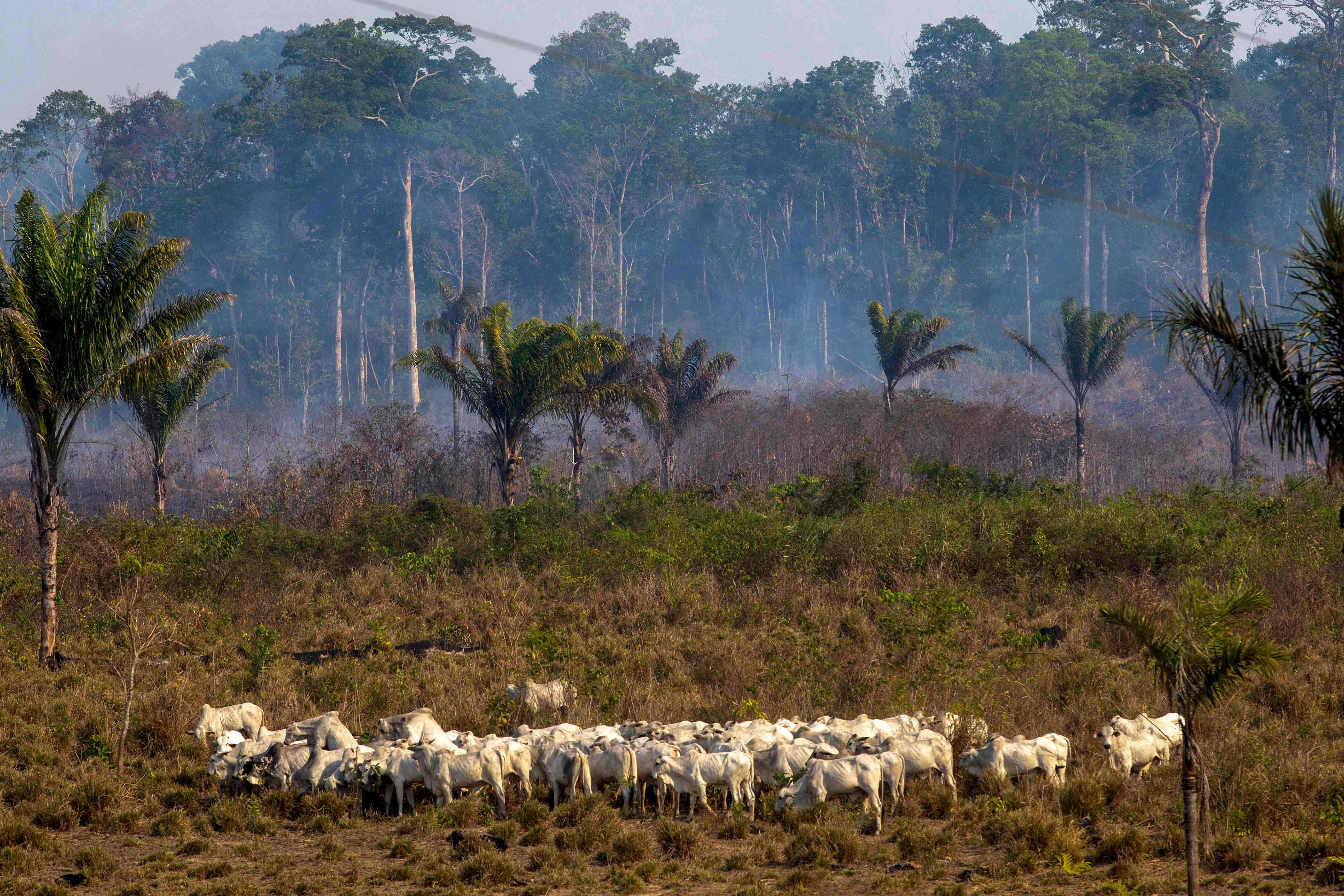A new report from sustainability organization Slow Factory Foundation and Stand.earth found that cattle farmers who produce leather for fashion brands such Nike, Adidas, H&M, Zara, and Coach are intensifying the deforestation of the Amazon rainforest.
The organization tracked down the leather exports and customs data and identified two main industries buying it: the auto industry for car seats and the fashion industry for shoes, handbags, and accessories.
The group also identified dozens of fashion brands that source hides from Amazon.
Greg Higgs, who led the study as director of research at Stand.earth, noted that cattle farming was a big part of the problem because ranchers clear the forests to create land for cows to graze.
While cutting down trees for cattle farming is illegal, the practice is unregulated.
Higgs says small-scale farmers, many living below the poverty line, shouldn't be blamed.
Rather, the fault belongs to the companies who are buying their hides.
According to the United Nations trade data, about 20 percent of leather is derived from the Brazilian Amazon.
The Amazon rainforest is crucial in fighting global warming because its trees absorb millions of tons of carbon dioxide annually.
Thus, by sourcing leather from the Amazon rainforest, fashion brands contribute to the problem.
The study's authors suggested that the fashion labels could change this by choosing more sustainable leather alternatives.
Adidas, Nike, and Coach all said that they are against Amazon deforestation and are part of the Leather Working Group, a nonprofit that certifies that leather is sustainably sourced.
However, the LWG only rates tanneries on their ability to trace leather back to slaughterhouses, not farms.
Meanwhile, H&M claims it has banned leather from Brazil since 2019 but admitted that it could be hard to trace the leather in its supply chain.



 South Africa Eyes ECB Repo Lines as Inflation Eases and Rate Cuts Loom
South Africa Eyes ECB Repo Lines as Inflation Eases and Rate Cuts Loom  Once Upon a Farm Raises Nearly $198 Million in IPO, Valued at Over $724 Million
Once Upon a Farm Raises Nearly $198 Million in IPO, Valued at Over $724 Million  Uber Ordered to Pay $8.5 Million in Bellwether Sexual Assault Lawsuit
Uber Ordered to Pay $8.5 Million in Bellwether Sexual Assault Lawsuit  Nasdaq Proposes Fast-Track Rule to Accelerate Index Inclusion for Major New Listings
Nasdaq Proposes Fast-Track Rule to Accelerate Index Inclusion for Major New Listings  Sony Q3 Profit Jumps on Gaming and Image Sensors, Full-Year Outlook Raised
Sony Q3 Profit Jumps on Gaming and Image Sensors, Full-Year Outlook Raised  SpaceX Prioritizes Moon Mission Before Mars as Starship Development Accelerates
SpaceX Prioritizes Moon Mission Before Mars as Starship Development Accelerates  Prudential Financial Reports Higher Q4 Profit on Strong Underwriting and Investment Gains
Prudential Financial Reports Higher Q4 Profit on Strong Underwriting and Investment Gains  How to create a thriving forest, not box-checking ‘tree cover’
How to create a thriving forest, not box-checking ‘tree cover’  Trump Endorses Japan’s Sanae Takaichi Ahead of Crucial Election Amid Market and China Tensions
Trump Endorses Japan’s Sanae Takaichi Ahead of Crucial Election Amid Market and China Tensions  LA fires: Long-term exposure to wildfire smoke is poorly understood − and a growing risk
LA fires: Long-term exposure to wildfire smoke is poorly understood − and a growing risk  SoftBank Shares Slide After Arm Earnings Miss Fuels Tech Stock Sell-Off
SoftBank Shares Slide After Arm Earnings Miss Fuels Tech Stock Sell-Off  Bank of Japan Signals Readiness for Near-Term Rate Hike as Inflation Nears Target
Bank of Japan Signals Readiness for Near-Term Rate Hike as Inflation Nears Target  RBI Holds Repo Rate at 5.25% as India’s Growth Outlook Strengthens After U.S. Trade Deal
RBI Holds Repo Rate at 5.25% as India’s Growth Outlook Strengthens After U.S. Trade Deal  Instagram Outage Disrupts Thousands of U.S. Users
Instagram Outage Disrupts Thousands of U.S. Users  Gold and Silver Prices Slide as Dollar Strength and Easing Tensions Weigh on Metals
Gold and Silver Prices Slide as Dollar Strength and Easing Tensions Weigh on Metals 































